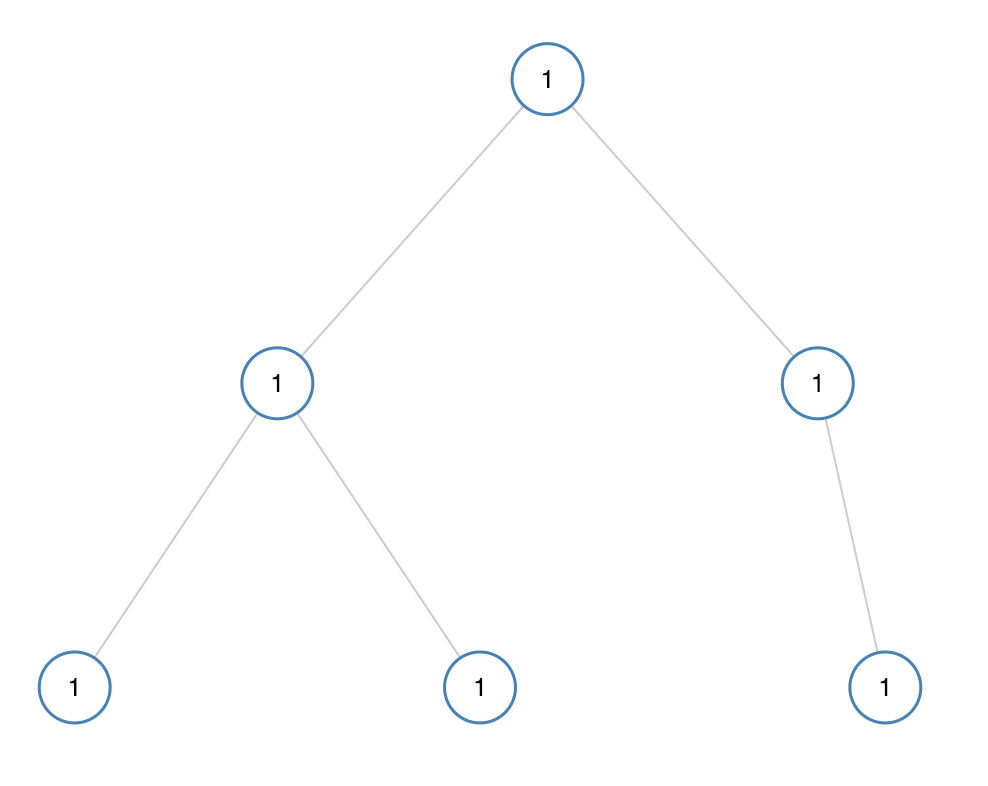二叉树
广度优先搜索
树
深度优先搜索
题目描述
如果二叉树每个节点都具有相同的值,那么该二叉树就是单值 二叉树。
只有给定的树是单值二叉树时,才返回 true;否则返回 false。
示例 1:
输入: [1,1,1,1,1,null,1]
输出: true
示例 2:
输入: [2,2,2,5,2]
输出: false
提示:
给定树的节点数范围是 [1, 100]。
每个节点的值都是整数,范围为 [0, 99] 。
解法
方法一:DFS
我们记根节点的值为 \(x\) ,然后设计一个函数 \(\text{dfs}(\text{root})\) ,它表示当前节点的值是否等于 \(x\) ,并且它的左右子树也是单值二叉树。
在函数 \(\text{dfs}(\text{root})\) 中,如果当前节点为空,那么返回 \(\text{true}\) ,否则,如果当前节点的值等于 \(x\) ,并且它的左右子树也是单值二叉树,那么返回 \(\text{true}\) ,否则返回 \(\text{false}\) 。
在主函数中,我们调用 \(\text{dfs}(\text{root})\) ,并返回结果。
时间复杂度 \(O(n)\) ,空间复杂度 \(O(n)\) 。其中 \(n\) 是树中的节点数目。
Python3 Java C++ Go TypeScript Rust
1
2
3
4
5
6
7
8
9
10
11
12
13
14
15 # Definition for a binary tree node.
# class TreeNode:
# def __init__(self, val=0, left=None, right=None):
# self.val = val
# self.left = left
# self.right = right
class Solution :
def isUnivalTree ( self , root : Optional [ TreeNode ]) -> bool :
def dfs ( root : Optional [ TreeNode ]) -> bool :
if root is None :
return True
return root . val == x and dfs ( root . left ) and dfs ( root . right )
x = root . val
return dfs ( root )
1
2
3
4
5
6
7
8
9
10
11
12
13
14
15
16
17
18
19
20
21
22
23
24
25
26
27
28
29
30 /**
* Definition for a binary tree node.
* public class TreeNode {
* int val;
* TreeNode left;
* TreeNode right;
* TreeNode() {}
* TreeNode(int val) { this.val = val; }
* TreeNode(int val, TreeNode left, TreeNode right) {
* this.val = val;
* this.left = left;
* this.right = right;
* }
* }
*/
class Solution {
private int x ;
public boolean isUnivalTree ( TreeNode root ) {
x = root . val ;
return dfs ( root );
}
private boolean dfs ( TreeNode root ) {
if ( root == null ) {
return true ;
}
return root . val == x && dfs ( root . left ) && dfs ( root . right );
}
}
1
2
3
4
5
6
7
8
9
10
11
12
13
14
15
16
17
18
19
20
21
22
23
24 /**
* Definition for a binary tree node.
* struct TreeNode {
* int val;
* TreeNode *left;
* TreeNode *right;
* TreeNode() : val(0), left(nullptr), right(nullptr) {}
* TreeNode(int x) : val(x), left(nullptr), right(nullptr) {}
* TreeNode(int x, TreeNode *left, TreeNode *right) : val(x), left(left), right(right) {}
* };
*/
class Solution {
public :
bool isUnivalTree ( TreeNode * root ) {
int x = root -> val ;
auto dfs = [ & ]( this auto && dfs , TreeNode * root ) -> bool {
if ( ! root ) {
return true ;
}
return root -> val == x && dfs ( root -> left ) && dfs ( root -> right );
};
return dfs ( root );
}
};
1
2
3
4
5
6
7
8
9
10
11
12
13
14
15
16
17
18
19 /**
* Definition for a binary tree node.
* type TreeNode struct {
* Val int
* Left *TreeNode
* Right *TreeNode
* }
*/
func isUnivalTree ( root * TreeNode ) bool {
x := root . Val
var dfs func ( * TreeNode ) bool
dfs = func ( root * TreeNode ) bool {
if root == nil {
return true
}
return root . Val == x && dfs ( root . Left ) && dfs ( root . Right )
}
return dfs ( root )
}
1
2
3
4
5
6
7
8
9
10
11
12
13
14
15
16
17
18
19
20
21
22
23
24 /**
* Definition for a binary tree node.
* class TreeNode {
* val: number
* left: TreeNode | null
* right: TreeNode | null
* constructor(val?: number, left?: TreeNode | null, right?: TreeNode | null) {
* this.val = (val===undefined ? 0 : val)
* this.left = (left===undefined ? null : left)
* this.right = (right===undefined ? null : right)
* }
* }
*/
function isUnivalTree ( root : TreeNode | null ) : boolean {
const x = root ! . val ;
const dfs = ( root : TreeNode | null ) : boolean => {
if ( ! root ) {
return true ;
}
return root . val === x && dfs ( root . left ) && dfs ( root . right );
};
return dfs ( root );
}
1
2
3
4
5
6
7
8
9
10
11
12
13
14
15
16
17
18
19
20
21
22
23
24
25
26
27
28
29
30
31
32
33
34
35
36 // Definition for a binary tree node.
// #[derive(Debug, PartialEq, Eq)]
// pub struct TreeNode {
// pub val: i32,
// pub left: Option<Rc<RefCell<TreeNode>>>,
// pub right: Option<Rc<RefCell<TreeNode>>>,
// }
//
// impl TreeNode {
// #[inline]
// pub fn new(val: i32) -> Self {
// TreeNode {
// val,
// left: None,
// right: None
// }
// }
// }
use std :: cell :: RefCell ;
use std :: rc :: Rc ;
impl Solution {
pub fn is_unival_tree ( root : Option < Rc < RefCell < TreeNode >>> ) -> bool {
let x = root . as_ref (). unwrap (). borrow (). val ;
fn dfs ( node : Option < Rc < RefCell < TreeNode >>> , x : i32 ) -> bool {
if let Some ( n ) = node {
let n = n . borrow ();
n . val == x && dfs ( n . left . clone (), x ) && dfs ( n . right . clone (), x )
} else {
true
}
}
dfs ( root , x )
}
}
GitHub


